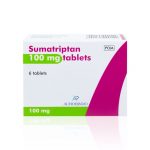 A serotonin agonist used to reduce the pain of an acute migraine headache. Marketed under the brand name imitrex.
A serotonin agonist used to reduce the pain of an acute migraine headache. Marketed under the brand name imitrex.
A drug which helps to narrow the blood vessels, used in the treatment of acute migraine.
Injectable medication used in the treatment of migraine headache; generally, relief occurs within ten minutes after its injection; side effects include atypical sensations (tingling, warmth, burning, tightness), flushing, injection-site reactions, and dizziness. Rarely, this agent can result in myocardial infarction when administered to persons with known ischemic heart disease.
A drug used to treat migraine. Sumatriptan (Imitrex) is used to treat acute migraine and cluster headaches. Sumatriptan is thought to work by constricting or narrowing the blood vessels in the brain that dilate during a migraine attack. Sumatriptan cannot prevent migraine or cluster headaches; it is used to treat a headache that has already begun. The sooner the drug is used in an attack, the better it works.
A drug used in the treatment of migraine attacks. Given by subcutaneous injection, it provides quick relief of pain, acting on the same receptors as 5-hydroxytryptamine a neurotransmitter and vasoconstrictor agent. It may also be taken orally, but sumatriptan should not be used within 24 hours of treatment with ergotamine, the standard antimigraine treatment.
A drug from the class of 5-hydroxytryptamine antagonists that can be given, either orally or by injection, to treat migraine headaches. Adverse effects include return of the headache and precipitation of angina pectoris in patients with coronary artery disease, among others.
A medication acting as a serotonin agonist, utilized for alleviating sudden bouts of migraine, especially when standard pain relievers have proven ineffective. It exhibits notable efficacy in managing cluster headaches. However, sumatriptan might lead to sensations of chest pain and constriction, tingling, flushing, dizziness, and weakness.
